
10 Criteria to Choose the Right ERP for Your Business
Updated on : 07 Aug 2024
Published : 16 Feb 2023
KPI

TABLE OF CONTENTS
TABLE OF CONTENTS
Leveraging the right Enterprise Resource Planning (ERP) software is critical for companies to manage their businesses efficiently. ERP implementation, when executed well can help a business streamline critical operations, improve customer satisfaction, and drive overall business growth. However, with so many ERP systems available in the market, choosing the right one can be a challenge. In this blog, we will outline the 10 important criteria to consider when selecting a cloud ERP system.
What are the 10 Key Criteria?
- Business Requirements
Consider the size of your organization, the types of services you offer, and your specific industry requirements. With well-defined objectives and tangible metrics, you can quantify the true ROI of your investment and propel your business forward. The vendor you choose should be able to provide an ERP solution that aligns with your unique business needs. Evaluate whether the ERP system can scale with your business growth and adapt to future requirements. - ERP Features
A robust ERP system should have the essential features that support your business operations. This includes some critical features typically including financial management, inventory management, supply chain management and more. Additionally, ensure the ERP system offers comprehensive reporting and analytics tools to provide capabilities for actionable insights. Consider what features matter most to your organization and ensure the vendor can provide them. - Cost of Ownership and ROI
The investment required for an ERP system can be significant , so it's essential to conduct a thorough assessment of its return on investment. This evaluation should include the total cost of ownership, software licensing fees, implementation expenditures, and ongoing maintenance costs. It is important to also account for hidden expenses, including additional training, customization, and the potential operational disruptions during the implementation process. - Implementation
The vendor is your implementation partner, so it’s crucial to understand the timeline and resources needed to get your ERP system up and running. Ask questions about the expected duration of the implementation process. With KPI’s NetSuite Implementation, you can rely on a seamless and efficient implementation process. This will help you reach your business goals as soon as possible setup, accelerating your journey towards your business objectives. - System Integration
Verify its ability to integrate with your existing business systems and applications. A leading ERP should not only bring business processes together but also seamlessly integrate with your preferred technologies In line with this, data migration is also important. Look for an ERP with real-time synchronization of data across systems. This way, you can ensure that your data is always up to date and your business runs efficiently. Lastly, prioritize ERP systems with robust cybersecurity features to safeguard sensitive business data. - Technology
Make sure that the technology is up-to-date and scalable to accomodate your future requirements . Incorporating cutting-edge technologies such as cloud computing, AI/Machine Learning, IoT, blockchain, and augmented reality has significantly expanded the capabilities of traditional ERP systems. These advancements offer enhanced analysis, insights, and personalized experiences,leading to informed decision making and streamlined processes. - Vendor Industry Expertise
When selecting an ERP vendor, it’s essential to assess their expertise in your industry. Look for a vendor who has a good track record of implementing similar ERPs successfully, along with positive references and financial stability for ongoing support. Industry expertise is crucial for a smooth implementation and effective solution. - Support and Training
Evaluate the vendor's expertise and commitment to timely responses. Consider managed support options for a successful adoption process. Additionally, prioritize the level of support and training provided by the vendor, including comprehensive documentation, online resources, and employee training opportunities. - Vendor and Product Roadmap
A good ERP vendor should have a clear product roadmap outlining their plans for future development and software upgrades. Evaluate the vendor's plans for improving their product through new versions and features. This will help ensure the ERP system meets your growing business needs. - Customization
Ensure the ERP system can be tailored to meet your specific business requirements. Evaluate both your current and future customization requirements for the Nestuite ERP customization. Keep in mind that the complexity of your business processes and the type of cloud deployment (single tenant versus multitenant) can affect the system's customization capabilities.
Important Questions to ask your ERP Implementation Vendor?
Business Requirements
- Does the ERP system cater to my industry-specific requirements?
- Does the ERP system match my business needs?
ERP Features
- Is the UI consistent and intuitive across modules?
- Does the ERP offer mobile accessibility?
- Are business intelligence tools included?
- Can new features/modules be added as my business grows?
Cost of Ownership and ROI
- What is the cost of the ERP system?
- How is the software licensed?
- What is the price inclusive of?
- When will I see ROI?
Implementation
- What is the time frame for implementation?
- Are tools for testing included with the software?
System Integration
- Is there integration between the ERP system and other business platforms?
- Can existing data be migrated into the new ERP easily?
Vendor industry Expertise
- Does the ERP vendor understand my industry well?
- How many successful ERP deployments has the vendor completed?
- Does the vendor offer client references?
Support and Training
- What level of support is offered during and after implementation?
- What is the expected turnaround time?
- Can employee training be provided?
Vendor and Product Roadmap
- What are the upcoming features? When will they be available?
- Does the vendor publish updates on a regular basis? Are the new enhancements or features provided at an additional cost?
Customization
- Is the ERP system both customizable and scalable?
- Is there support available for customization?
ERP Features
- Is the UI consistent and intuitive across modules?
- Does the ERP offer mobile accessibility?
- Are business intelligence tools included?
- Can new features/modules be added as my business grows?
Cost of Ownership and ROI
- What is the cost of the ERP system?
- How is the software licensed?
- What is the price inclusive of?
- When will I see ROI?
Implementation
- What is the time frame for implementation?
- Are tools for testing included with the software?
System Integration
- Is there integration between the ERP system and other business platforms?
- Can existing data be migrated into the new ERP easily?
Vendor industry Expertise
- Does the ERP vendor understand my industry well?
- How many successful ERP deployments has the vendor completed?
- Does the vendor offer client references?
Support and Training
- What level of support is offered during and after implementation?
- What is the expected turnaround time?
- Can employee training be provided?
Vendor and Product Roadmap
- What are the upcoming features? When will they be available?
- Does the vendor publish updates on a regular basis? Are the new enhancements or features provided at an additional cost?
Customization
- Is the ERP system both customizable and scalable?
- Is there support available for customization?

The Wrap
Selecting the right ERP solution is crucial for your business's success. By evaluating these 10 key criteria, you can make an informed decision and optimize your investment. For your ERP implementation needs, trust KPI as your reliable NetSuite ERP provider. With 100+ successful implementations across diverse industries, make the smart choice for your business and start your ERP journey with KPI today.
